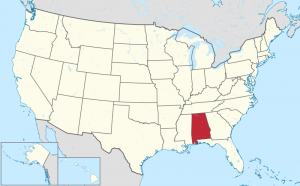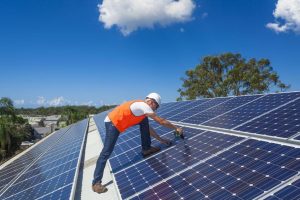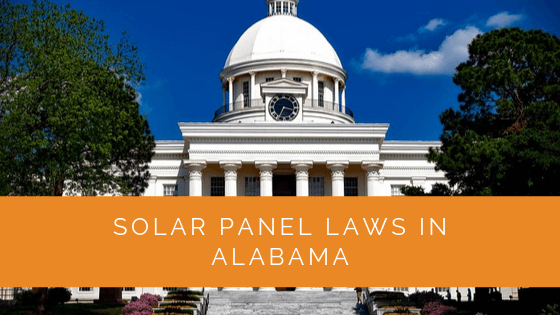 If you’re considering installing solar panels in your home, you’ll want to ensure you are fully aware of the local laws. If you have a better understanding of Alabama solar panel laws, you can make an informed decision about what you want to do next.
If you’re considering installing solar panels in your home, you’ll want to ensure you are fully aware of the local laws. If you have a better understanding of Alabama solar panel laws, you can make an informed decision about what you want to do next.
Contents
- 1 Key Takeaways
- 2 Net Metering Laws
- 3 Grid Parity
- 4 Financial Incentives
- 5 Regulatory Programs
- 6 The Federal Solar Tax Credit
- 7 Energy Usage In Alabama
- 8 HOA Restrictions
- 9 Case Study: Residential Solar Installation in Alabama
- 10 Expert Insights From Our Solar Panel Installers About Solar Panel Laws in Alabama
- 11 Experience Solar Excellence with Us!
Key Takeaways
- Alabama lacks statewide policies for net metering, making it essential for residents to choose a reliable utility company for proper metering.
- Alabama is considered a “grid parity” state, making solar power generally more cost-effective compared to many other states.
- Alabama offers several financial incentive programs for adopting solar power, and residents should explore these options to maximize savings.
Net Metering Laws
According to federal requirements, every state must offer net metering to people with installed solar panels However, in Alabama, there are no statewide policies regarding net metering. It’s one of only four states that do not have these requirements in place.
This means that net metering is handled through the utility company that you are working with. You’ll want to be cautious about which company you choose to work with so that you won’t have any issues with metering. The Solar Panels Network USA is a popular choice. We have many different types of solar panels, which can be freely monitored on the internet.
Grid Parity
Alabama is what is commonly referred to as a “grid parity” state. This means that solar power tends to be cheaper here than it is in many other states. Grid parity is a measurement that compares the standard cost of regular electricity against the cost of solar power. This is also known as socket parity.
Many people choose to have solar panels installed in Alabama because they’re hoping to save money. If you’re in Alabama, you should know that your savings will likely be even more substantial than in other parts of the country. You should learn more about Alabama’s laws and see what you will likely spend on electricity.
Financial Incentives
At the time of writing, Alabama has seven financial incentive programs for people adopting solar power. These programs include the AlabamaSAVES Revolving Loan Program and the Local Government Energy Loan Program. It’s a wise idea to learn more about these programs and what they include if you decide whether solar power is a smart investment.
It would be best if you aimed to look at all seven incentive programs so that you can see which ones you are eligible for. If you’re in Alabama and not participating in these programs, you will ultimately leave money on the table. Being aware of these programs is financially prudent for you.
Regulatory Programs
In many states, there are regulatory programs that work to support solar energy adoption. Unfortunately, there are not currently any programs like this in place in Alabama. However, people who live in Alabama can still benefit from the programs that currently exist at the federal level.
Now that solar power is popular, Alabama may develop its regulatory programs. The state’s laws regarding solar power have already changed many times, and they will likely undergo even more changes in the future. Solar panel restrictions are constantly changing.
The Federal Solar Tax Credit
Anyone in the United States can take advantage of the federal solar tax credit. However, if you live in Alabama, you should know that the tax credit stacks with other financial incentives. This will allow you to enjoy even more savings.
While installing solar panels can be a big investment, it could ultimately wind up paying for itself. You should crunch the numbers to see how much your solar panels will likely save you.

Energy Usage In Alabama
In many ways, Alabama is an ideal state for solar panels. After all, Alabama sees plenty of sunshine year-round. However, residents of the state primarily use natural gas, coal, and nuclear energy. Biomass and hydroelectric power are also very popular in this state.
However, this is likely to change as Alabama adopts more laws and financial incentives that encourage people to install solar panels. Once people can see how much they can benefit from installing solar panels, they will want to invest in solar power sooner rather than later. Solar power and solar panels are excellent for the environment and provide all kinds of savings opportunities.
HOA Restrictions
You won’t just have to consider state laws on solar panels when deciding whether you should have new solar panels installed in your home. You will look at the restrictions that your Homeowner’s Association has in place. Some states, like Arizona, Florida, and California, have laws preventing HOAs from enacting these restrictions. Alabama, however, does not have these kinds of laws in place.
There are still limits on how much your HOA can restrict you. With that said, you’ll want to be aware of what kinds of restrictions you have. If you’re an HOA member, you should see what restrictions you are expected to abide by. You’ll want to be aware of all of the regulations that you will have to follow.
Being familiar with Alabama’s solar panel laws can help you determine whether or not solar panels are right for your home. Solar panel installation has some clear benefits, and you’ll be better equipped to enjoy all of those benefits if you make sure you’re familiar with your state’s laws. Now that you know what the laws say, it’s up to you to decide whether you want solar panels installed.
Case Study: Residential Solar Installation in Alabama
Background
At Solar Panels Network USA, we are committed to advancing sustainable energy solutions. Recently, we undertook a residential solar installation project in Huntsville, Alabama, reflecting the state’s legislative environment. This case study highlights the practical benefits of Alabama’s solar panel laws and demonstrates the advantages of solar energy in a region known for its abundant sunshine.
Project Overview
The homeowners in Huntsville aimed to reduce their energy bills and take advantage of Alabama’s financial incentives for solar power. They approached us to design and implement a solar solution that would maximize their savings while complying with local regulations.
Implementation
We began with a detailed site assessment to determine the optimal placement for the solar panels, ensuring maximum sunlight capture. By analyzing the household’s historical energy consumption data, we tailored a system that would meet their specific energy needs.
Given Alabama’s lack of statewide net metering policies, we carefully selected a utility company known for its favorable metering practices. This choice was crucial to ensure the homeowners could efficiently manage their energy production and consumption without encountering metering issues.
We installed high-efficiency photovoltaic panels along with an advanced energy storage system. This setup included smart inverters and a monitoring system, providing real-time data on energy production and usage. The configuration not only optimized energy production but also supported energy storage, ensuring continuous power supply during outages and peak demand periods.
Results
The Huntsville homeowners experienced immediate reductions in their energy bills due to the efficiency of the installed solar panels and the favorable grid parity conditions in Alabama. The energy storage system provided additional security, ensuring uninterrupted power supply during outages.
The financial incentives available in Alabama, such as the AlabamaSAVES Revolving Loan Program and the Local Government Energy Loan Program, significantly reduced the initial investment cost. These programs, combined with the federal solar tax credit, made the transition to solar energy highly cost-effective.
Our detailed monitoring system allowed the homeowners to track their energy savings and system performance, providing transparency and fostering trust in solar technology. This successful project also sparked interest in the local community, with several neighbors expressing interest in similar installations.
Summary
This Huntsville project demonstrates how understanding and leveraging Alabama’s solar panel laws can lead to significant financial and environmental benefits. By choosing the right utility company and taking advantage of available financial incentives, homeowners can achieve substantial energy savings. At Solar Panels Network USA, we are proud to contribute to Alabama’s growing solar energy landscape, one installation at a time.
Expert Insights From Our Solar Panel Installers About Solar Panel Laws in Alabama
Understanding Alabama’s solar panel laws is crucial for making an informed decision about solar installations. Despite the lack of statewide net metering policies, choosing a reliable utility company can help ensure smooth metering and maximize your benefits.
Senior Solar Installer
Alabama’s status as a ‘grid parity’ state makes it an attractive location for solar power installations. With solar energy being cheaper here compared to many other states, residents can expect significant savings on their energy bills.
Lead Solar Technician
The various financial incentive programs available in Alabama can substantially offset the initial costs of solar panel installations. It’s essential to explore these options to make the most of the economic benefits provided by solar energy.
Solar Project Manager
Experience Solar Excellence with Us!
Trust in Solar Panels Network USA, where our seasoned experts deliver top-quality solar solutions for homes and businesses nationwide. With a legacy of countless successful installations and a commitment to sustainable energy, we’re your reliable partner in the solar journey. Ready for a brighter, eco-friendly future? Call us now at (855) 427-0058 and harness the power of the sun!
Map image by Wikimedia Commons User: TUBS / CC-BY-SA-3.0
About the Author
Solar Panels Network USA stands at the forefront of solar energy solutions, driven by a team of seasoned solar engineers and energy consultants. With over decades of experience in delivering high-quality solar installations and maintenance, we are committed to promoting sustainable energy through customer-centric, tailored solutions. Our articles reflect this commitment, crafted collaboratively by experts to provide accurate, up-to-date insights into solar technology, ensuring our readers are well-informed and empowered in their solar energy decisions.

